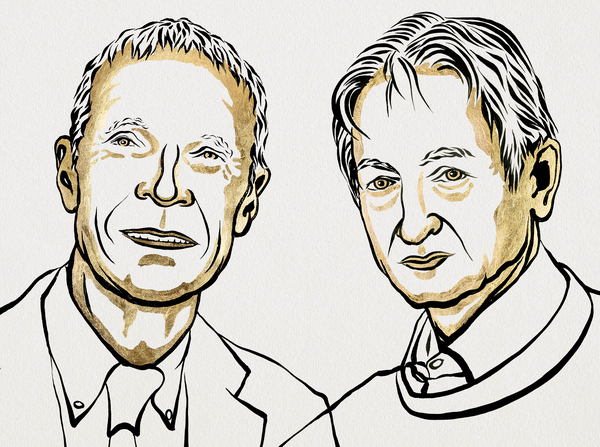John J. Hopfield and Geoffrey E. Hinton won the Nobel Prize in Physics 2024 ‘for foundational discoveries and inventions that enable machine learning with artificial neural networks’. We asked Professors Achille Giacometti and Guido Caldarelli (Theoretical Physics), and Marcello Pelillo (Informatics) for their comments.
‘We have all experienced struggling to recall a word, only managing to remember the first or last letters. Then suddenly, the fog clears, and the term magically forms in our brain. This happens because our brain uses associative memory, i.e. an image associated with the word helps us to remember a word or a number that we wouldn't otherwise be able to recall.
The brain is composed of neurons and synapses that form a network similar to an airline network, with neurons acting as airports and synapses as air routes. Unlike a static network, the brain's network is dynamic, with routes being decommissioned and upgraded. This flexibility allows for complex global behaviour that is not simply the sum of individual neuronal behaviours, and it underlies associative memory. For example, when we tap a typo on a mobile phone, our device often corrects the word using associative memory, similar to how the brain functions. This principle is fundamental to the development of Artificial Intelligence.
The 2024 Nobel Prize in Physics was awarded to John Hopfield and Geoffrey Hinton. Hopfield was recognised for laying the theoretical foundations, while Hinton was awarded for turning these theories into practical tools scalable to technological applications. But what does Physics have to do with the brain and Artificial Intelligence? It is certainly no coincidence that Hopfield has a background in Theoretical Physics of Matter and is an expert in Statistical Mechanics. His 'Hopfield model' is based on Ising's model, which explains ferromagnetism. 'Boltzmann machine', introduced by Hinton to recognise elements in a dataset, is inspired by the Boltzmann equation, a fundamental concept in Statistical Mechanics used, for example, to explain the arrow of time.
Modern artificial intelligence systems are based on computational models inspired by the structure of the brain, known as 'neural networks’. These systems 'learn' through various forms of an algorithm called 'back-propagation,' introduced by Hinton in the 1980s. The network solves difficult problems by ‘learning’ from known examples, similar to the way our brains learn. This approach experienced significant growth a decade ago when richer and more accurate databases for learning and increasing computing power became available. The availability of these algorithms is revolutionising our lives, and yet their potential applications and social impact make us concerned. A field where these techniques are not being used in some form or another barely exists today.
The 2024 Nobel Prize brings to the fore the contribution of Statistical Physics to the understanding of this field of research and the creation of new digital technologies. Artificial Intelligence, which originated in the 1950s as a branch of computer science, rapidly drew the interest of researchers from diverse fields and evolved into a highly interdisciplinary subject. It has been influenced not only by physics, but also by neuroscience, psychology, mathematics, and, importantly, philosophy.
A fine example of this collaboration, which also involved biochemists, is the recent success of Google's Deep Mind team. This highly interdisciplinary team successfully used Artificial Intelligence along with well-organized databases to solve a half-century-old problem: how to predict the native structure of a protein by knowing its sequence.
Ca' Foscari has a long tradition in the field of Artificial Intelligence, both as a teaching and research subject, dating back to the mid-1990s. During a time when AI was considered a niche discipline and viewed with suspicion, Ca’ Foscari took the initiative to establish the first course in Artificial Intelligence as part of the newly established degree programme in Computer Science. Since then, the university has been offering a comprehensive master's curriculum on the subject, attracting students from around the world. The interdisciplinary approach that characterises Artificial Intelligence is well established in our University and is conveyed through other courses that span different disciplines, such as Physical Engineering.










